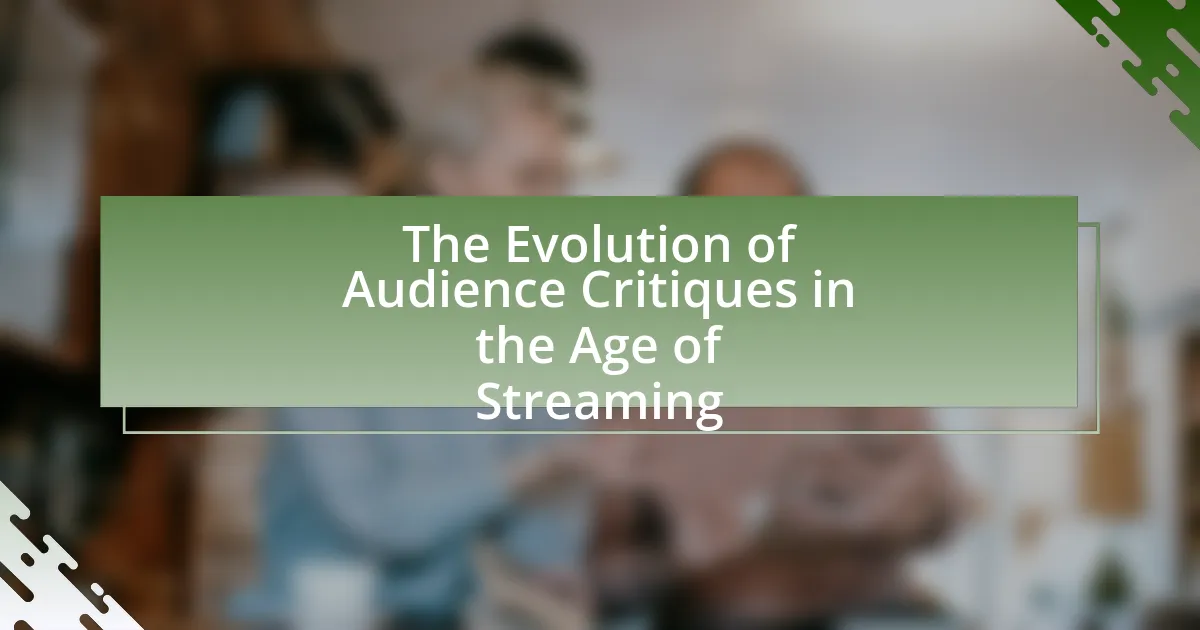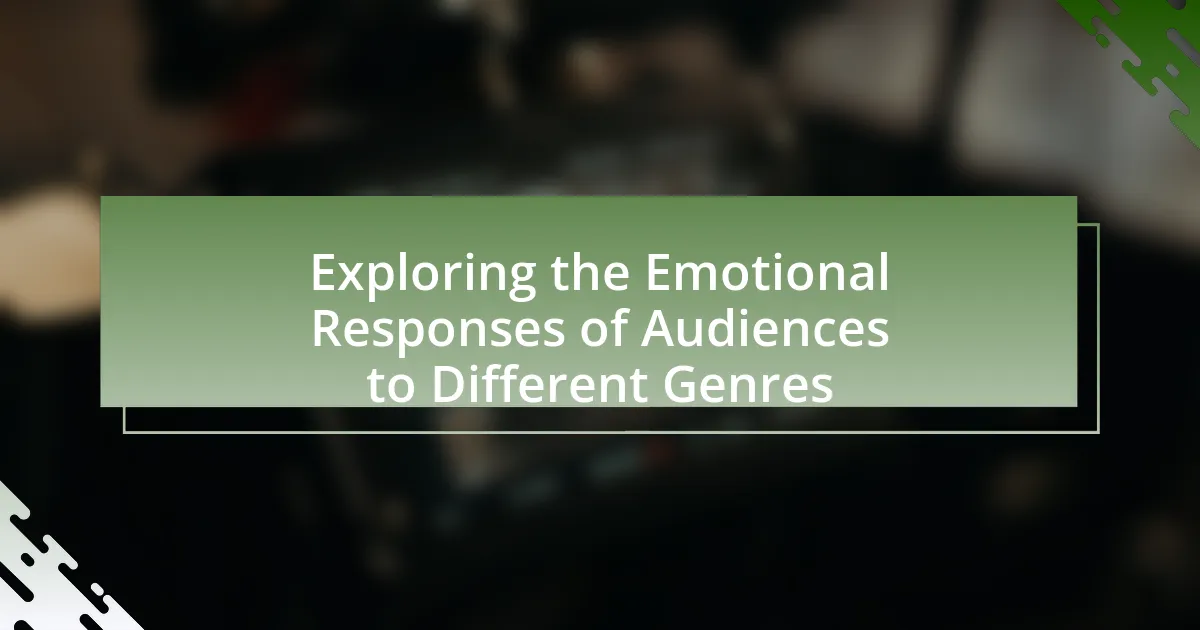The main entity of the article is audience engagement in movie marketing. The article explores the evolving landscape of audience engagement, emphasizing the importance of personalized and interactive experiences driven by advancements in technology such as data analytics and artificial intelligence. It defines audience engagement as the emotional connection and interaction between viewers and promotional content, highlighting key elements like personalization, interactivity, and storytelling that enhance engagement. The article also discusses the impact of audience engagement on box office performance, innovative strategies emerging in the field, and the challenges marketers face in adapting to changing consumer behaviors and privacy concerns. Additionally, it addresses ethical considerations and best practices for responsible marketing in the film industry.
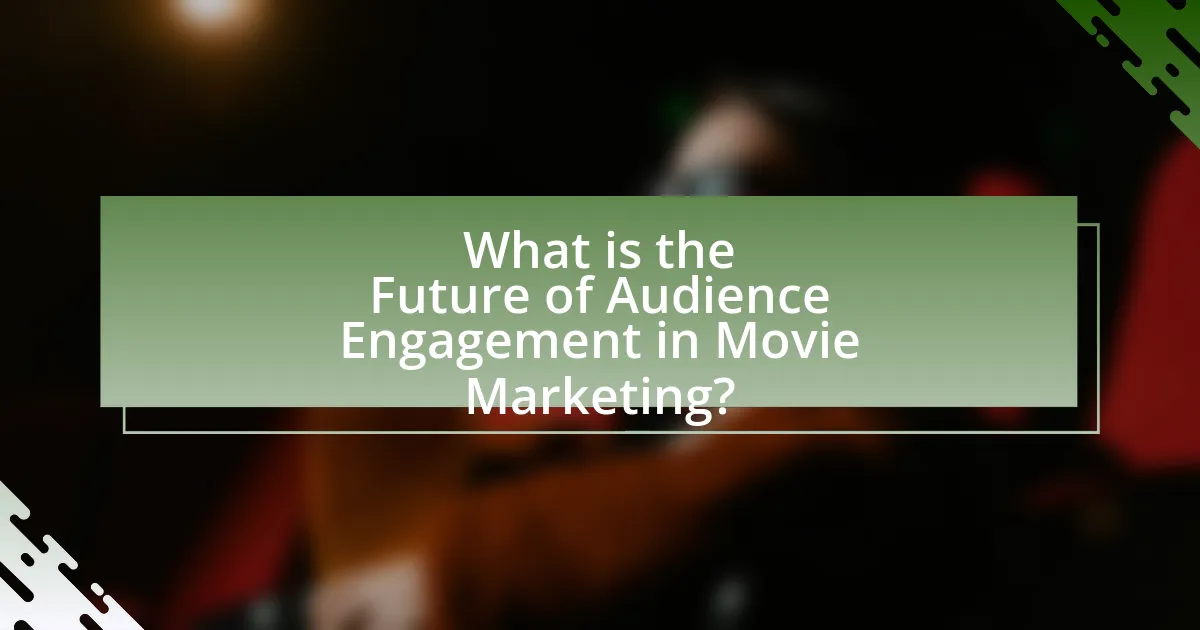
What is the Future of Audience Engagement in Movie Marketing?
The future of audience engagement in movie marketing will increasingly rely on personalized and interactive experiences. As technology advances, marketers will utilize data analytics and artificial intelligence to tailor content to individual preferences, enhancing viewer connection. For instance, platforms like Netflix already employ algorithms to recommend films based on user behavior, demonstrating the effectiveness of personalized marketing strategies. Additionally, immersive technologies such as virtual reality and augmented reality will create engaging promotional experiences, allowing audiences to interact with movie content in innovative ways. This shift towards a more participatory approach is supported by research from the Interactive Advertising Bureau, which indicates that interactive ads can increase viewer engagement by up to 47%.
How is audience engagement defined in the context of movie marketing?
Audience engagement in the context of movie marketing is defined as the interaction and emotional connection between the audience and the film’s promotional content. This engagement can manifest through various channels, including social media interactions, participation in promotional events, and audience-generated content, which collectively enhance the film’s visibility and appeal. Research indicates that films with higher audience engagement often experience increased box office performance, as seen in the success of franchises like Marvel, where social media buzz and fan participation significantly contribute to their marketing strategies.
What are the key elements that contribute to effective audience engagement?
The key elements that contribute to effective audience engagement include personalization, interactivity, and storytelling. Personalization allows marketers to tailor content to individual preferences, enhancing relevance and connection; studies show that personalized marketing can increase engagement rates by up to 202%. Interactivity encourages active participation from the audience, fostering a sense of community and investment in the content; for instance, campaigns that incorporate user-generated content often see higher engagement levels. Storytelling captivates audiences by creating emotional connections, with research indicating that narratives can increase information retention by 65%. These elements collectively enhance audience engagement in movie marketing by making experiences more relatable, participatory, and memorable.
How does audience engagement differ from traditional marketing approaches?
Audience engagement differs from traditional marketing approaches by prioritizing interactive and two-way communication over one-way messaging. Traditional marketing typically relies on broadcasting messages to a passive audience, while audience engagement fosters active participation, allowing consumers to influence content and share their experiences. For instance, a study by the Content Marketing Institute found that 70% of consumers prefer to learn about products through content rather than traditional advertisements, highlighting the effectiveness of engagement strategies in capturing attention and building relationships.
Why is audience engagement becoming increasingly important in movie marketing?
Audience engagement is becoming increasingly important in movie marketing because it directly influences box office performance and audience loyalty. Engaging audiences through interactive campaigns, social media, and personalized content fosters a deeper connection, leading to higher ticket sales. For instance, a study by the Motion Picture Association found that films with strong social media engagement saw a 20% increase in opening weekend revenue compared to those with minimal engagement. This trend highlights the necessity for filmmakers and marketers to prioritize audience interaction to enhance visibility and drive success in a competitive market.
What trends are driving the shift towards greater audience engagement?
The trends driving the shift towards greater audience engagement in movie marketing include the rise of personalized content, the integration of social media platforms, and the use of interactive technologies. Personalized content allows marketers to tailor messages based on audience preferences, enhancing relevance and connection. Social media platforms facilitate direct communication and community building, enabling audiences to engage with brands and each other in real-time. Interactive technologies, such as augmented reality and gamification, create immersive experiences that captivate audiences and encourage participation. These trends are supported by data showing that personalized marketing can increase engagement rates by up to 20%, while interactive content generates twice the engagement of static content.
How does audience engagement impact box office performance?
Audience engagement significantly impacts box office performance by driving ticket sales and enhancing word-of-mouth promotion. Engaged audiences are more likely to share their experiences on social media, leading to increased visibility and interest in a film. For instance, a study by the Motion Picture Association found that films with strong social media engagement can see a 20% increase in box office revenue compared to those with minimal engagement. Additionally, audience participation in marketing campaigns, such as interactive promotions or fan events, can create a sense of community and loyalty, further boosting attendance.
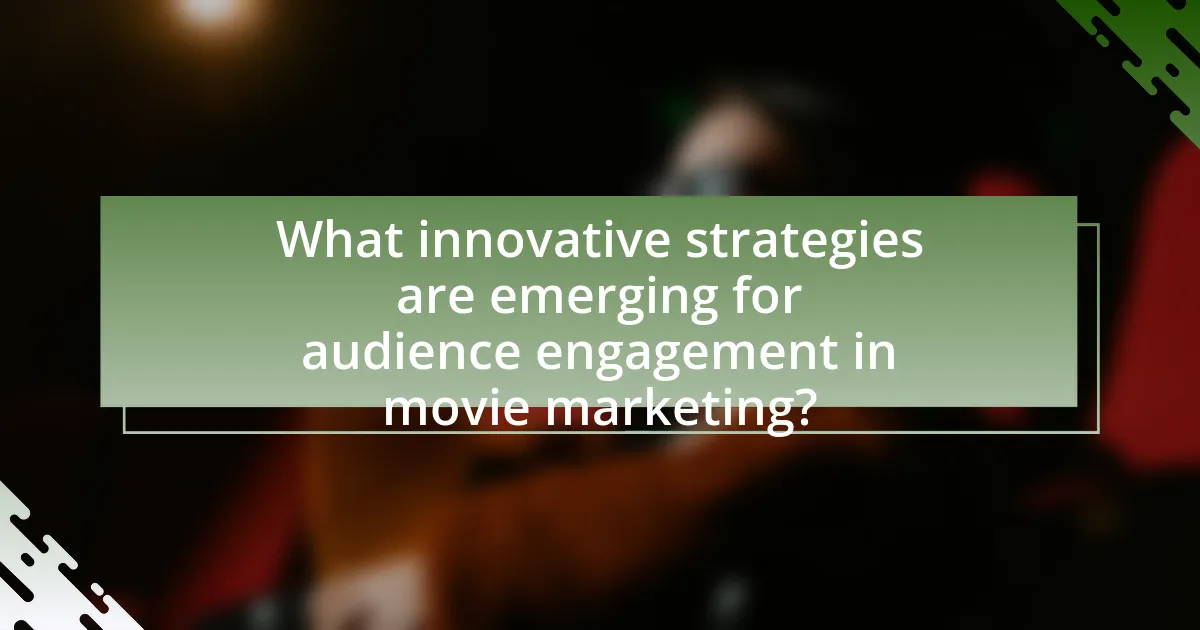
What innovative strategies are emerging for audience engagement in movie marketing?
Innovative strategies emerging for audience engagement in movie marketing include interactive storytelling, augmented reality experiences, and social media-driven campaigns. Interactive storytelling allows audiences to influence plot outcomes, enhancing emotional investment; for example, films like “Bandersnatch” from the “Black Mirror” series have successfully utilized this approach. Augmented reality experiences, such as those seen in the marketing for “Ghostbusters: Afterlife,” enable fans to engage with the film’s universe through their devices, creating immersive experiences. Social media-driven campaigns leverage platforms like TikTok and Instagram to create viral challenges and user-generated content, significantly increasing audience participation and reach, as evidenced by the success of the “Shrek” TikTok challenge, which generated millions of views and interactions. These strategies reflect a shift towards more participatory and immersive marketing techniques in the film industry.
How are social media platforms being utilized for audience engagement?
Social media platforms are utilized for audience engagement by enabling direct interaction between brands and consumers, fostering community building, and facilitating real-time feedback. For instance, platforms like Instagram and Twitter allow movie studios to share trailers, behind-the-scenes content, and host live Q&A sessions, which enhance viewer interest and participation. According to a 2021 survey by Statista, 54% of respondents reported that they follow brands on social media to stay updated on new products and promotions, indicating that these platforms effectively capture audience attention and maintain engagement.
What role do influencers play in enhancing audience engagement?
Influencers significantly enhance audience engagement by leveraging their established trust and relatability with followers. They create authentic connections through personalized content, which resonates more deeply than traditional marketing methods. For instance, a study by the Digital Marketing Institute found that 49% of consumers depend on influencer recommendations, highlighting their effectiveness in driving engagement. Additionally, influencers often foster community interaction through comments and shares, further amplifying audience participation and interest in the content they promote.
How can interactive content improve audience participation?
Interactive content can significantly enhance audience participation by actively engaging users in the experience, leading to higher retention and interaction rates. For instance, studies show that interactive elements such as polls, quizzes, and games can increase user engagement by up to 70% compared to static content. This engagement fosters a sense of involvement and investment in the content, encouraging audiences to share their experiences and opinions, which amplifies reach and visibility. Additionally, interactive content allows for personalized experiences, catering to individual preferences, which further motivates participation and creates a more immersive environment.
What technologies are shaping the future of audience engagement?
Artificial intelligence, augmented reality, and data analytics are shaping the future of audience engagement in movie marketing. Artificial intelligence enhances personalization by analyzing viewer preferences and behaviors, allowing marketers to tailor content and advertisements effectively. Augmented reality creates immersive experiences that engage audiences in innovative ways, such as interactive trailers or virtual reality environments related to the film. Data analytics provides insights into audience demographics and engagement patterns, enabling marketers to optimize their strategies and reach target audiences more efficiently. These technologies collectively transform how audiences interact with movie marketing, making it more engaging and relevant.
How is data analytics influencing audience engagement strategies?
Data analytics is significantly influencing audience engagement strategies by enabling marketers to tailor content and campaigns based on audience behavior and preferences. By analyzing data from social media interactions, viewing habits, and demographic information, marketers can identify trends and patterns that inform targeted messaging. For instance, a study by McKinsey & Company found that companies using data-driven marketing strategies can increase their ROI by 15-20%. This evidence underscores the effectiveness of data analytics in enhancing audience engagement through personalized experiences and optimized marketing efforts.
What impact do virtual and augmented reality have on audience experiences?
Virtual and augmented reality significantly enhance audience experiences by creating immersive environments that engage users on a deeper emotional level. These technologies allow audiences to interact with content in ways that traditional media cannot, such as experiencing scenes from a movie as if they were part of the narrative. For instance, a study by PwC found that 78% of consumers believe that virtual reality can enhance their experience of entertainment, indicating a strong preference for immersive storytelling. Additionally, augmented reality applications in movie marketing, like interactive trailers or location-based experiences, have been shown to increase viewer interest and engagement, leading to higher ticket sales.
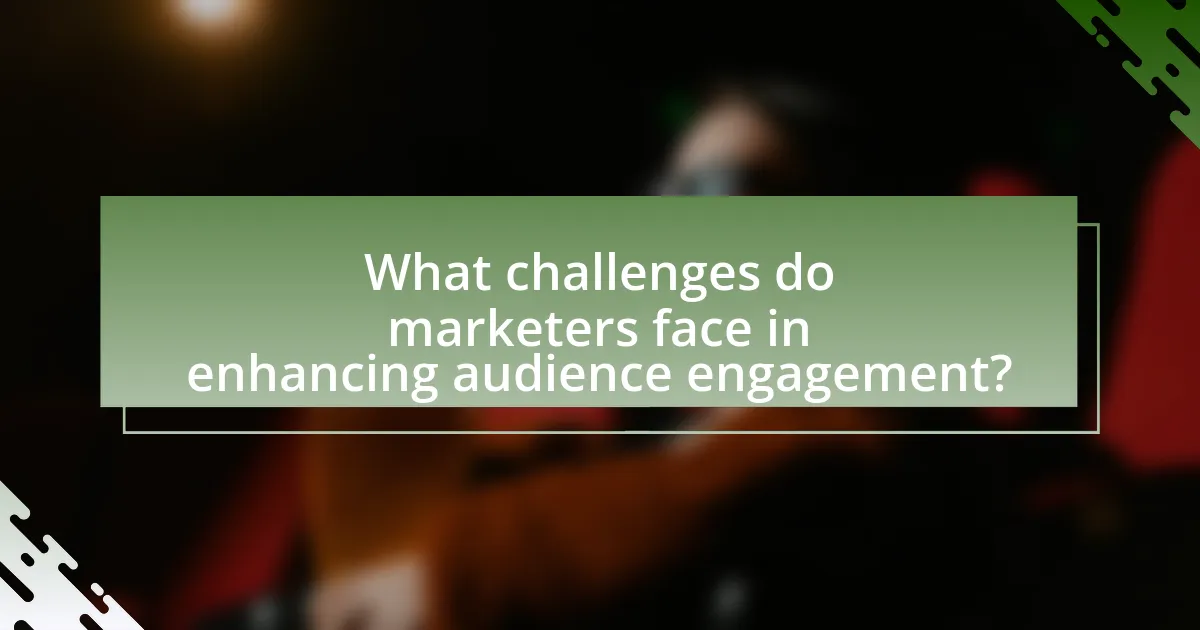
What challenges do marketers face in enhancing audience engagement?
Marketers face several challenges in enhancing audience engagement, primarily due to the saturation of digital content and the evolving preferences of consumers. The overwhelming amount of information available online makes it difficult for marketers to capture and maintain audience attention. Additionally, changing consumer behaviors, such as the shift towards personalized content and the demand for authentic interactions, complicate engagement strategies. According to a 2022 report by HubSpot, 70% of consumers prefer brands that understand their individual needs, highlighting the necessity for marketers to adapt their approaches to meet these expectations effectively.
How do changing consumer behaviors affect engagement strategies?
Changing consumer behaviors significantly impact engagement strategies by necessitating a shift towards more personalized and interactive marketing approaches. As consumers increasingly seek tailored experiences, engagement strategies must adapt to incorporate data-driven insights that reflect individual preferences and behaviors. For instance, a study by McKinsey & Company found that 71% of consumers expect companies to deliver personalized interactions, highlighting the need for marketers to leverage analytics and customer feedback to enhance engagement. This shift towards personalization not only improves customer satisfaction but also fosters brand loyalty, as consumers are more likely to engage with brands that understand and cater to their unique needs.
What are the common pitfalls in audience engagement efforts?
Common pitfalls in audience engagement efforts include a lack of understanding of the target audience, inconsistent messaging, and failure to utilize data analytics effectively. Understanding the target audience is crucial; without it, engagement strategies may miss the mark, leading to low interaction rates. Inconsistent messaging can confuse potential viewers and dilute brand identity, making it harder for audiences to connect with the content. Additionally, neglecting data analytics prevents marketers from measuring engagement success and optimizing strategies based on audience feedback and behavior patterns. According to a study by the Content Marketing Institute, 63% of marketers struggle with audience understanding, highlighting the prevalence of this pitfall in engagement efforts.
How can marketers overcome resistance to new engagement methods?
Marketers can overcome resistance to new engagement methods by demonstrating the effectiveness and benefits of these methods through data-driven results. For instance, studies show that personalized marketing strategies can increase customer engagement by up to 20%, as evidenced by a report from McKinsey & Company. By showcasing successful case studies and providing clear metrics that highlight improved audience interaction and conversion rates, marketers can build trust and encourage adoption of innovative engagement techniques. Additionally, offering training and support can help alleviate concerns and facilitate a smoother transition to new methods.
What ethical considerations must be addressed in audience engagement?
Ethical considerations in audience engagement include transparency, consent, and respect for privacy. Transparency involves clearly communicating the purpose and methods of engagement to the audience, ensuring they understand how their data will be used. Consent requires obtaining explicit permission from individuals before collecting or utilizing their personal information, aligning with regulations such as GDPR. Respect for privacy entails safeguarding audience data and avoiding manipulative practices that exploit vulnerabilities. These considerations are essential to maintain trust and foster a positive relationship between marketers and their audience, as evidenced by studies showing that ethical practices enhance brand loyalty and consumer satisfaction.
How can privacy concerns impact audience engagement strategies?
Privacy concerns can significantly impact audience engagement strategies by limiting the data available for targeted marketing and personalization. When audiences are wary of how their personal information is collected and used, they may opt out of sharing data, leading to less effective engagement tactics. For instance, a 2021 survey by Pew Research Center found that 79% of Americans are concerned about how their data is being used by companies, which directly influences their willingness to engage with brands that rely on data-driven strategies. Consequently, marketers must adapt by prioritizing transparency and building trust, which can involve implementing stricter data protection measures and offering clear opt-in options for data sharing. This shift not only addresses privacy concerns but also fosters a more engaged audience that feels secure in their interactions with brands.
What measures can be taken to ensure responsible marketing practices?
To ensure responsible marketing practices, companies should implement transparency, ethical standards, and consumer protection measures. Transparency involves clearly communicating the nature of products and services, including any potential risks or limitations, which builds trust with consumers. Ethical standards require marketers to avoid misleading claims and to respect consumer privacy, aligning with guidelines set by organizations such as the American Marketing Association. Consumer protection measures, such as adhering to regulations like the Federal Trade Commission’s guidelines, help safeguard against deceptive practices. These approaches collectively foster a responsible marketing environment that prioritizes consumer welfare and ethical integrity.
What best practices can enhance audience engagement in movie marketing?
Utilizing interactive content significantly enhances audience engagement in movie marketing. Interactive elements such as polls, quizzes, and augmented reality experiences allow audiences to participate actively, fostering a deeper connection with the film. For instance, a study by the Interactive Advertising Bureau found that interactive ads can increase viewer engagement by up to 47%, demonstrating the effectiveness of this approach. Additionally, leveraging social media platforms for targeted campaigns and user-generated content encourages fans to share their experiences, further amplifying reach and engagement.
How can storytelling be effectively used to engage audiences?
Storytelling can be effectively used to engage audiences by creating emotional connections and immersive experiences. When narratives resonate with viewers, they foster empathy and investment in characters and plots, which enhances audience retention and participation. Research indicates that stories activate multiple areas of the brain, making the experience more memorable; for instance, a study published in the journal “Neuroscience” found that narratives can stimulate brain activity related to sensory experiences, leading to deeper engagement. Additionally, incorporating relatable themes and conflicts allows audiences to see themselves in the story, further strengthening their connection and interest.
What role does feedback play in refining engagement strategies?
Feedback is crucial in refining engagement strategies as it provides insights into audience preferences and behaviors. By analyzing feedback, marketers can identify what resonates with their audience, allowing them to adjust their strategies accordingly. For instance, a study by the American Marketing Association found that companies that actively seek and implement customer feedback see a 10-15% increase in customer satisfaction and engagement. This demonstrates that feedback not only informs but also enhances the effectiveness of engagement strategies in movie marketing.



